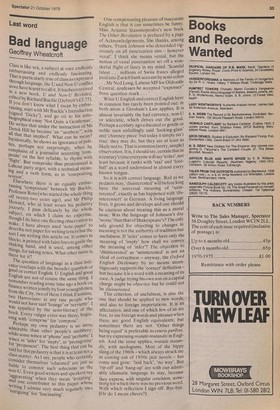Last word
Bad language
Geoffrey Wheatcroft
Class is like sex, a subject at once endlessly embarrassing and endlessly fascinating. That is particularly true of class as expressed through language, the U and Non-U conflict aswe have learnt to call it. It has been revived in a new book, U and Non-U Revisited, edited by Richard Buckle (Debrett's£3.75). If you don't know what I mean by embarrassing, start with Mr Buckle's Introduction (signed `Dicky'), and go on to his autobiographical essay 'Not Quite a Gentleman', He writes that under the instruction of Mr Derek Hill he became 'an "aesthete", with all that that implied'. What can he Incidentally, he shows an ignorance of poli tics, mean? Perhaps not surprisingly, when he complains of a journalist accenting 'composite' on the last syllable, to rhyme with 'flight'. But composite thus pronounced is Labour party argot, with a technical meaning and a verb form, as in 'cornpositing session'. Elsewhere there is an equally embarrassing 'symposium' between Mr Buckle, Professor Ross (who started the whole thing off twenty-two years ago), and MT Philip Howard, who at least wears his pedantry jocosely. I pass delicately by the whole subject, on which I claim no expertise, though I do have one fleeting observation to make. I have always used notepaper to describe not paper for writing letters but the sort I am writing this article on. It comes in blocks, is printed with faint lines to guide the Shaking hand, and is used, among other things, for taking notes. What other name is there for it? The question of language as a class indicator overlaps with the broader question of good or correct English. U English and good English are not of course the same thing. I remember reading some time ago a book on finance written jointly by four youngish men from the City, two of them I think Etonians, two Harrovians: at any rate people who would not have said 'lounge' or 'serviette'. I was appalled by the semi-literacy of the book. Every vulgar error was there, beginning with 'comprise' for 'compose'. Perhaps my own pedantry is no more admirable than other people's snobbery; While some wince at 'phone' and 'perfume' I wince at 'infer' for 'imply', at 'protagonist' for 'proponent'. The best thing that can be said for this pedantry is that it is at least not a class matter. As I say, people who certainly consider themselves 'educated' are just as liable to commit such solecisms as the non-U. Even good writers and speakers say 'aggravating' when they mean 'irritating', and one contributor to this paper whose writingI admire very much regularly uses Intriguing' for 'fascinating'. One corn pensating pleasure of inaccurate English is that it can sometimes be funny. Miss Arianna Stassinopoulos's new book The Other Revolution is prefaced by a page of Acknowledgements. She thanks, among others, 'Frank Johnson who descended vigorously on all punctuation sins — however venal'. I think she means venial, but the notion of venal punctuation set off a wonderful tlight of fancy in my mind. 'Scandal latest . . . millions of Swiss francs alleged paid into Zurich bank account by semi-colon . Mr Ned Long, Labour MP for Oldcastle Central, confesses he accepted "expenses" from question mark. What U English and correct English have in common has rarely been pointed out: in both areas a Gresham's Law applies. It is almost invariably the bad currency, non-U or solecistic, which drives out the good. Perhaps a century ago educated or gentle or noble men unfailingly said looking-glass' and 'chimney-piece' but today it simply isn't true: they may do, but they are at least as likely not to. That is common (sorry, simple) observation. It is, I should say, certain that in a century's time everyone will say 'toilet', not least because it ranks with 'taxi' and 'football' as a word understood in almost every known tongue. So it is with correct language. Rail as we pedants may, 'disinterested' will before long have the universal meaning of 'uninterested', exactly as has happened with `disinteressiert' in German. A living language lives, it grows and develops and one should be cautious about treating this as a moral issue. Was the language of Johnson's day 'worse ' than that of Shakespeare's? The only safe ground for objecting to changes in meaning is not the authority of tradition but usefulness. If 'infer' comes to have only the meaning of 'imply' how shall we convey the meaning of 'infer'? The objection to 'disinterested' as 'uninterested' is not an ideal of correctness — anyway, the Oxford English Dictionary by no means unambiguously supports the 'correct' definition — but because it is a word with a meaning of its own. A judge trying his own son on a capital charge might be objective but he could not be disinterested. This criterion, of usefulness, is also the one that should be applied to new words, and also to foreign importations. It is an affectation, and one of which few of us are free, to use foreign words and phrases when there are good English equivalents; but sometimes there are not. 'Other things being equal' is preferable to ceteris paribus, but try expressing mutatis mutandis in English. And the same applies, mutatis mutandis, with neologisms. Most of the hippy slang of the 1960s —which always struck me as coming out of 1950s jazz novels — has come and gone: 'laid back', `no way'. But 'rip-off and 'hang-up' are with our admirably idiomatic language to stay, because they express, with singular concision, something tor which there was no previous word. With which reflection I sign off. Bye-bye. (Or do I mean cheers?)






































 Previous page
Previous page